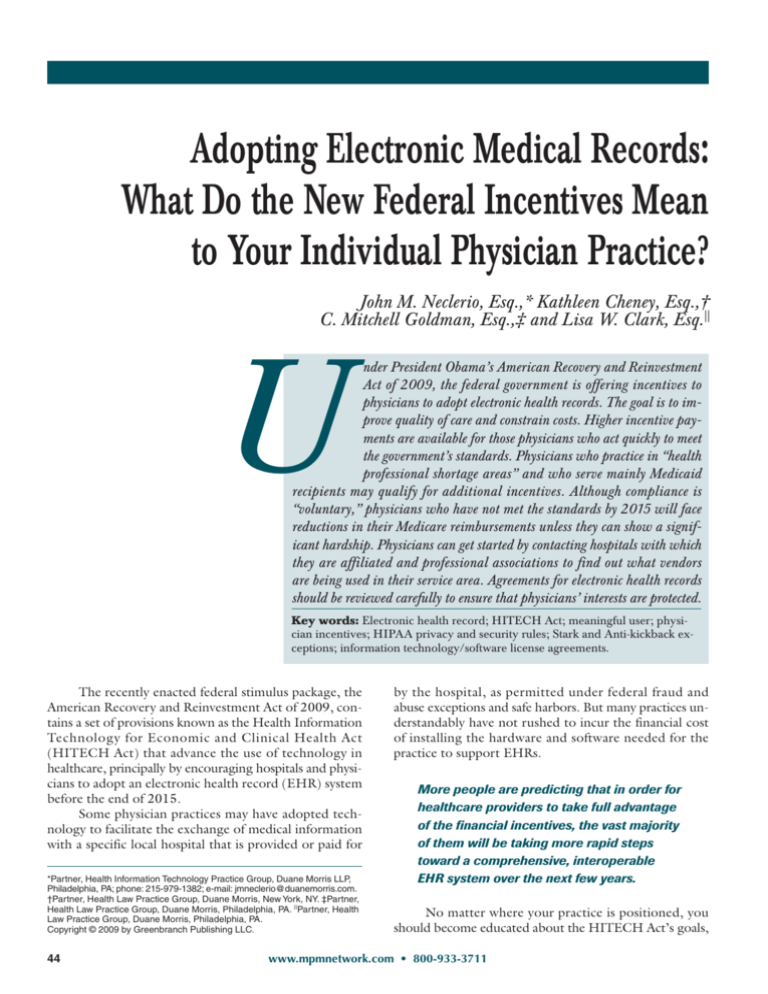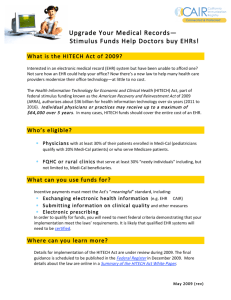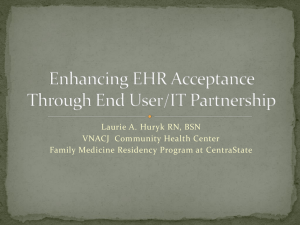Adopting Electronic Medical Records
advertisement

Adopting Electronic Medical Records: What Do the New Federal Incentives Mean to Your Individual Physician Practice? John M. Neclerio, Esq.,* Kathleen Cheney, Esq.,† C. Mitchell Goldman, Esq.,‡ and Lisa W. Clark, Esq.|| U nder President Obama’s American Recovery and Reinvestment Act of 2009, the federal government is offering incentives to physicians to adopt electronic health records. The goal is to improve quality of care and constrain costs. Higher incentive payments are available for those physicians who act quickly to meet the government’s standards. Physicians who practice in “health professional shortage areas” and who serve mainly Medicaid recipients may qualify for additional incentives. Although compliance is “voluntary,” physicians who have not met the standards by 2015 will face reductions in their Medicare reimbursements unless they can show a significant hardship. Physicians can get started by contacting hospitals with which they are affiliated and professional associations to find out what vendors are being used in their service area. Agreements for electronic health records should be reviewed carefully to ensure that physicians’ interests are protected. Key words: Electronic health record; HITECH Act; meaningful user; physician incentives; HIPAA privacy and security rules; Stark and Anti-kickback exceptions; information technology/software license agreements. The recently enacted federal stimulus package, the American Recovery and Reinvestment Act of 2009, contains a set of provisions known as the Health Information Technology for Economic and Clinical Health Act (HITECH Act) that advance the use of technology in healthcare, principally by encouraging hospitals and physicians to adopt an electronic health record (EHR) system before the end of 2015. Some physician practices may have adopted technology to facilitate the exchange of medical information with a specific local hospital that is provided or paid for *Partner, Health Information Technology Practice Group, Duane Morris LLP, Philadelphia, PA; phone: 215-979-1382; e-mail: jmneclerio@duanemorris.com. †Partner, Health Law Practice Group, Duane Morris, New York, NY. ‡Partner, Health Law Practice Group, Duane Morris, Philadelphia, PA. ||Partner, Health Law Practice Group, Duane Morris, Philadelphia, PA. Copyright © 2009 by Greenbranch Publishing LLC. 44 by the hospital, as permitted under federal fraud and abuse exceptions and safe harbors. But many practices understandably have not rushed to incur the financial cost of installing the hardware and software needed for the practice to support EHRs. More people are predicting that in order for healthcare providers to take full advantage of the financial incentives, the vast majority of them will be taking more rapid steps toward a comprehensive, interoperable EHR system over the next few years. No matter where your practice is positioned, you should become educated about the HITECH Act’s goals, www.mpmnetwork.com • 800-933-3711 Neclerio, Cheney, Goldman, and Clark/Federal Incentives requirements, and financial incentives available for physicians. The Obama administration has made HITECH a priority, and the failure to take steps to implement EHRs will only delay the inevitable, ultimately resulting in reduced incentive payments as well as intangible costs, such as patient perception. This article briefly reviews the law and its requirements for physicians, discusses the costs and benefits from taking action, and identifies some of the steps that your practice can take today. FACILITATION OF TRANSFORMATION FROM PAPER-BASED RECORDS TO EHRS How will the HITECH Act facilitate a transformation from paper-based records to EHRs? The country has been slow to convert a paper-based medical record system to an EHR system. This change will now likely take place in that the HITECH Act provides for a plan to facilitate the implementation of a nationwide infrastructure as well as a significant amount of federal funding in order to assist healthcare providers, including physicians, with the process. More people are predicting that in order for healthcare providers to take full advantage of the financial incentives, the vast majority of them will be taking more rapid steps toward a comprehensive, interoperable EHR system over the next few years. Specifically, the HITECH Act establishes new responsibilities for the U.S. Department of Health and Human Ser vices (HHS), through the Office of the National Coordinator for Health Information Technology (Office of the National Coordinator) to develop and adopt policies and standards, including new privacy standards, for EHRs and other forms of health information technology. The HITECH Act establishes two federal advisory committees: the HIT Policy Committee and the HIT Standards Committee. The HIT Policy Committee has been established to make recommendations to the National Coordinator for the implementation and appropriate uses of a nationwide health IT infrastructure. The HIT Standards Committee has been established to recommend the actual standards, implementation specifications, and certification criteria for the electronic exchange and use of health information. By December 31, 2009, HHS is to adopt an initial set of standards. In doing so, the Office of the National Coordinator may adopt standards already established by the Certification Commission for Healthcare Information Technology or by the Healthcare Information Technology Standards Panel. The Act has two primary funding components— one component that provides for about $2 billion immediately to HHS and the Office of the National Coordinator so that it may fulfill its duties consistent with the development of a nationwide health IT infrastructure through the development of standards and certification criteria and the coordination of health IT policies through a federal 45 health IT strategic plan; and a second component that sets aside $17 billion for healthcare providers who can demonstrate their use of a certified EHR. While adopting an EHR system is “voluntary” for physicians, the government wants implementation to occur quickly so all of the incentives are to occur during a five-year period with the largest payments being made earlier in the program. The first component provides for a general in vestment in the nation’s infrastructure to promote the electronic exchange and use of health information by providing for immediate funding for grants to various federal agencies as well as to states and state designees that will help healthcare organizations with upfront funding for EHRs. In particular, the funding is intended to support, among other things: 1. An EHR infrastructure and technologies, including standards, to allow for a nationwide electronic flow and use of health information in a secure, private manner, including the support of regional and sub-national efforts toward connecting health information exchanges; 2. The development and adoption of appropriate certified EHRs; 3. The infrastructure and tools for the promotion of telemedicine; 4. The promotion of interoperable clinical data repositories performing comparative effectiveness research on how electronic data use impacts healthcare treatments and strategies; 5. The promotion of technologies and best practices that enhance the protection of health information; 6. The integration of health IT education in the training of healthcare professionals; 7. The improvement and expansion of the use of health IT by public health departments; and 8. The establishment of a Health IT Research Center and regional Health IT Extension Centers to provide information to healthcare providers on best practices, vendor selection, implementation, and training. HITECH AND PHYSICIANS How does the HITECH Act apply to physicians? Because the government wishes to assist healthcare providers, including physicians, in adopting an EHR system and promote the exchange of information among providers so that patients receive informed care (i.e., so the information will no longer sit in particular hospital silos), the second component of the HITECH Act with the majority of the funds allocated, $17 billion, is for incentive payments that will reward hospitals and physicians www.mpmnetwork.com • 800-933-3711 46 Medical Practice Management • July/August 2009 for effectively using an EHR system. There is a program designed for those that see large volumes of Medicaid patients and another for those that accept Medicare. In order to qualify for these incentive payments, physicians will need to demonstrate “meaningful use” of an EHR by proving three elements: (1) use of an EHR with e-prescribing capability that meets current HHS standards; (2) connectivity to other providers to improve access to the full view of a patient’s health history; and (3) the ability to report on their use of the technology to HHS. After 2015, physicians and hospitals that are not meaningful EHR users will receive reduced Medicare payments. While adopting an EHR system is “voluntary” for physicians, the government wants implementation to occur quickly so all of the incentives are to occur during a five-year period with the largest payments being made earlier in the program; and, eventually, there will be financial consequences for a hospital or physician that does not implement an EHR system. For example, physicians and hospitals that are “meaningful EHR users” are eligible for Medicare incentive payments starting in 2011, and ending in 2015, in an amount equal to an additional 75% of the allowed charge for professional services furnished by the physician with the payments capped at maximum amounts of $18,000 per year for 2011 and 2012 and decreasing each year thereafter. No incentive payments will be made in 2016, and physicians for whom the first payment year is after 2014 will receive no incentive payment. After 2015, physicians and hospitals that are not meaningful EHR users will receive reduced Medicare payments. Beginning in 2015, unless the Secretary of HHS exempts a physician due to a significant hardship, physicians who are not meaningful users will find their Medicare reimbursements reduced by 1% to 3% each year with authority granted to HHS to reduce further the reimbursement rate beginning in 2018 if the proportion of eligible professionals who are meaningful EHR users is less than 75%. The HITECH Act also allows for an additional reimbursement of 10% for hospitals and physicians providing services in an area designated by the Secretary of HHS as a “health professional shortage area.” Some exceptions to the payment rules exist. Also, Medicaid monies will be available to the states, certain hospitals, and certain physicians to develop EHR systems. In general, for “eligible professionals” who show “meaningful use” of an EHR system, the maximum Medicare incentive payment that a physician may receive for early use (i.e., 2011) is $48,400, which is available if the physician predominantly furnishes services in a health professional shortage area. Other physicians may receive up to $44,000 for early use. As mentioned above, for each year after 2011 that the physician becomes a meaningful EHR user, these incentive payments will be reduced. The incentive provision excludes “hospital-based eligible professionals,” and special rules are established for eligible professionals affiliated with “qualified Medicare Advantage organizations.” For Medicaid, if more than 30% of a physician’s patients pay with Medicaid (20% for pediatricians), then the physician is eligible for payments of up to $64,000 over five years. The incentives will be calculated through a formula that factors in the exact Medicaid mix of the physician’s patients, as well as amounts ranging from $25,000 in the first year to $10,000 in subsequent years. Additionally, nurse practitioners and nurse midwives are eligible for the same incentives. HITECH AND STARK AND ANTI-KICKBACK RULES How does the HITECH Act relate to the federal Stark exception and Anti-Kickback safe harbor permitting hospital EHR programs provided or paid for by hospitals? In 2006, the Centers for Medicare & Medicaid Services (CMS) and the Office of Inspector General (OIG) adopted new regulations creating a new Stark exception and Anti-Kickback safe harbor to promote the adoption of EHR and e-prescribing. Specifically, the federal Stark law (prohibiting Medicare/Medicaid payments for services that were “self-referred” by a physician to an entity in which the physician has a financial interest) and the Anti-Kickback law (prohibiting Medicare/Medicaid payments for services for which there was financial inducement) permit hospitals to provide or donate to physicians and other providers information technology (plus training and desk support) to create, maintain, transmit, or receive EHRs in order to enhance the local delivery of care. There are a number of conditions that apply, including that the parties enter into written agreements and that the recipient pay a cost-sharing requirement. The HITECH Act provisions create an incentive program for hospitals and physicians to further promote EHR systems that meet the “meaningful user” standards. The HITECH Act does not modify the Stark and Anti-Kickback provisions, or hospital-based EHR systems that may have been provided or paid for by hospitals and physicians pursuant to these rules. Rather, the HITECH Act provisions create an incentive program for hospitals and physicians to further promote EHR systems that meet the “meaningful user” standards. However, hospitals and physicians that adopted EHR systems in response to the Stark/Anti-Kickback provisions will be www.mpmnetwork.com • 800-933-3711 Neclerio, Cheney, Goldman, and Clark/Federal Incentives required to review their systems to ensure that they meet the “meaningful user” standards in order to be eligible for financial incentives. HITECH AND HIPAA What effect will the HITECH Act have on the HIPAA privacy and security rules? The HITECH Act substantially modifies the existing HIPAA privacy and security requirements to provide additional privacy and security rights and requirements that benefit the individual and requires that the business associate agreements between covered entities and business associates be updated to reflect any new privacy or security requirements of the HITECH Act. Unless otherwise specified, the effective date of all provisions is 12 months from the date of enactment of the HITECH Act, or February 17, 2010. Primary changes include: • Extending HIPAA’s privacy and security requirements directly to business associates (vs. the obligations applying to business associates as a contractual obligation to the covered entity); • Establishing new breach notification requirements for all covered entities requiring the covered entities to report most security breaches directly to individuals; • Defining which actions constitute a breach (including some inadvertent disclosures); • Permitting individuals to request an accounting of the disclosures of their electronic protected health information, as is contained in the EHR, over the preceding three years; • Imposing restrictions on certain disclosures, sales, and marketing of protected health information; • Authorizing increased civil monetary penalties for HIPAA violations and granting authority to state attorneys general to enforce HIPAA violations. COSTS VS. BENEFITS What are the costs of implementation versus the benefits of taking action? While the costs of taking action are the cost of investment in the hardware and software and the lost revenue for the time spent in learning a new system and training office staff on its use, there are many benefits to promptly implementing an EHR system. First, you will have the opportunity to receive a greater amount in incentives if you start the process earlier. Second, you will be investing in your practice for something that consumers will likely be looking to see now that the HITECH Act has become so publicized. And while it may have been difficult to make this investment years ago for fear of selecting the wrong vendor, there is now some basic criteria for a meaningful user, and most major vendors are either already meeting the certification standards 47 that will be the basis for the HITECH Act standards or plan to be in compliance once these standards are more fully defined. Third, and most importantly, you will be implementing a system that will be able to improve the efficiencies of your practice and the overall healthcare system and the ability to administer care for your patients (i.e., no more silo effect, but the ability for your patients to use an EHR that you provide with any area hospital as well as any specialty practice in another state). Ultimately, in the long run, this will make for improved medical care for the community. TAKING ACTION TODAY What steps can your practice take today? While the Medicare reimbursement payments are not scheduled to begin until 2011, healthcare entities will not qualify for the reimbursements simply by purchasing and implementing a system, or by assuming that any existing hospital/physician EHR system is satisfactory; they must demonstrate that they are meaningful EHR users of a certified EHR. The transition to a new EHR system may take time in order for organizations to review their current system or choose the right system for their practice, develop an implementation plan, revise or install the system, and connect to other networks and providers. The demand to install systems over the next few years (in order for providers to receive the largest reimbursement benefits under the statute) may outweigh the ability of healthcare IT software vendors and consulting professionals to supply the products and services. Therefore, at a minimum, practices should start considering what steps to take in order to begin the process. For example, if you are affiliated with a hospital, you might want to contact the hospital to determine whether it anticipates making changes to its system, what vendor the hospital is using, and how its affiliates might start to hold discussions with this vendor concerning product revision, purchase, and/or implementation. If you are not affiliated with a hospital, you still might want to contact area hospitals to ask what vendors they are using or plan to use. You can also begin researching EHR vendors on your own and request information about costs and timing for implementation. If you belong to a physicians association, you may wish to reach out to the association to find out what other physicians in your area are doing, and discuss the possibility of approaching certain vendors for a group discount on any hardware or software purchases made by members of the association. You can even reach out to commercial lenders and discuss financing options for software and hardware. Or ask software vendors what options they might have, and discuss with your accountants any possible tax deductions and depreciation schedules for investing in a new www.mpmnetwork.com • 800-933-3711 48 Medical Practice Management • July/August 2009 software system and other expense planning for the practice regarding the investment. In addition, when you receive a contract from a vendor, you should review the terms and be prepared to ask the vendor questions about it. For example, among other issues to raise, you can ask about: • What the vendor’s methodology is for implementation and how the vendor’s implementation process occurs to ensure a successful implementation (i.e., timing for implementation, payment milestones with final payment upon full implementation, commitment of a single contact or project manager, vendor progress reports); • What warranties and remedies exist for system failure (i.e., repair and replace vs. full refund); • How responsive the vendor is to maintenance issues that occur or help desk inquiries that must be made; • If the software is Web based, how is the data backed up during the agreement and what happens to the data upon termination of the agreement; • What warranties exist that the software and any updates will cause the practice to be in compliance with the definition of a “meaningful EHR user” and any HIPAA and HITECH Act privacy and security requirements; • Whether the license grant covers all intended users in the practice as well as any outside computer consultants that the practice might hire; and • What limitation on liability exists for the vendor and whether there are exceptions to it such as vendor indemnity obligations for HIPAA/HITECH compliance and privacy and security violations. Finally, as a result of the changes to the privacy and security rules, physician practices, as a covered entity, should take steps to review their current privacy and security practices; update policies to incorporate the HITECH statute; become aware of breach notification requirements so that if there is any security issue, the practice can act in compliance with the Act; and update any business associate agreements that the practice might have with current or new outside vendors to reflect the obligations under the HITECH Act. CONCLUSION Because the government has allocated substantial sums for the implementation of EHRs and established a system of incentives for implementation and the public is becoming more educated about the stimulus funds and the benefits of such a system, the failure of a physician practice to take steps to implement will only be avoiding the inevitable and wind up resulting in reduced incentive payments and the same financial costs. In this respect, every physician practice, if it hasn’t already done so, should start the process of becoming educated about what the practice will need to do to install such a system. Being inactive will not only have a long-term effect on the practice’s bottom line, but will also likely result in the practice being viewed by its patients as slow to implement what is being viewed as a positive for patient care and for improving the overall inefficiency of the U.S. healthcare industry. ■ www.mpmnetwork.com • 800-933-3711





